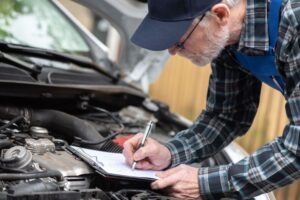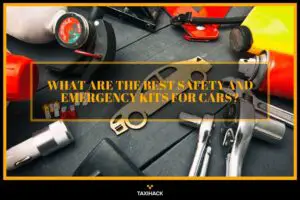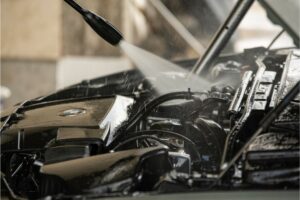When it comes to owning and driving a car, it is really important to keep the vehicle maintenance up to date and inspect your car, as certain rules and regulations need to be followed for safety on the road.
Why would a car fail a safety inspection?
Commonly, people can fail a safety inspection over really small mistakes because they had little to no knowledge as they did no research.
A car might fail safety inspection because you did not fix or replace certain things in your car.
Make sure to look into every little thing in your car every time before you go for a re-inspection.
In this article, with my thorough research, I will be providing you with the causes of why your car might fail the safety inspection and what exactly you can do to prevent this from happening again.
So make sure to read through the whole article as it will be helpful in the long run.
Table of Contents
- 1 Common Causes Why A Car Might Fail A Safety Inspection
- 2 Conclusion
Common Causes Why A Car Might Fail A Safety Inspection

In various parts of the world, car inspection is necessary as it will help protect you and others around you on the road.
Once you are a car owner, there will be certain rules and regulations that you should be informed about to prevent any serious situation.
When it comes to inspection, you might not know what part of your vehicle will pass or fail. This is why it is important that you read through this article, as it will be helpful.
List Of Things You Should Check
Here are the most common inspection failures:
- Clogged air filters.
- Contaminated engine oil.
- Worn out, damaged spark plugs.
- Exhaust Gas Recirculation (EGR) or Positive Crankcase Ventilation (PCV) might malfunction.
- Gas cap leaks or missing.
- Broken tail lights, headlights, turn signals, or reflectors.
- Leakage of any fuel type.
- Tires are worn out, not properly inflated, or damaged.
- Broken car mirrors.
- Ignition is wrong.
- Tinting of your vehicle might not meet the state requirements.
- Failing catalytic converters.
- Oxygen system failure.
- Car mirrors.
- Horn is not working accurately.
- Windshields wiper and blades.
- Seat belts failure.
Causes And Solutions
If there is an issue with this feature in your vehicle, then commonly, your vehicle might face a faulty turn signal with a burnt-out light bulb. As a result, your signaling will be laid down.
You need to note that you will have signaling lights in the front as well at the back of your vehicle, so make sure to get that check, and if there is a fault, then it is important to get your signal light bulbs replaced soon as possible.
Furthermore, one of the essential elements of your vehicle is the headlights, and they must be working properly at all times.
It is easy to spot when there is an issue with your headlights as they are visible.
You must get those fixed before your inspection as it will keep you and others on the road safe while driving.
Moreover, it is also common that your air filters can get dirty, and they can affect the performance of your engine.
This is also another reason why a car might fail safety inspections.
This is not something you should take lightly, as failed air filters will not be working efficiently, and during the test, they might fail to provide hydrocarbon levels.
They are not that expensive and are easy to replace, so make sure to check and replace them as soon as possible.
Lastly, it is important to note that if your car gas cap is damaged or leaking, or missing, the inspectors will immediately fail and would not allow cars to drive on the road as it can be dangerous.
This is because the gas cap will prevent fumes from getting into the air, so make sure you get the cap as they are easily replaced and are not expensive.
3 Types Of Inspection
There are generally three types of inspection required for the safety of your vehicle and the safety of you and others around you when you are driving; the vehicle safety inspection, emissions test, and physical damage inspection.
You must pass these entire tests!
Type 1: The Physical Damage Inspection
In multiple states like New York, New Jersey, and Florida, it is required to have a physical damage inspection to prevent insurance fraud.
It is important to keep your car fully maintained and is working properly, so it is not a threat to the driver or others on the road.
The physical damage is most commonly done when your vehicle can be caught in an accident with another car which can cause damages that might not be visible but have bigger impacts.
Type 2: The Vehicle Safety Inspection
This is the most common inspection procedure mainly done in various parts of the world.
It is designed to ensure that it is safe for drivers to drive the vehicle on the roads or not, which is why you must pass this test.
Certain things that will be checked during this vehicle inspection are your car’s interiors and exteriors, such as tires, headlight, car mirrors, engine oil, etc.
Type 3: The Emissions Safety Inspection
This is an important inspection procedure that will identify the issues that need work, and it is also necessary to pass this test. This inspection is also called the smog test.
The main purpose of this inspection is to measure pollutant levels such as hydrocarbon, carbon dioxide, and oxygen.
This is also important so that your vehicle does not expose anything that will harm the environment.
How Often Should You Get A Safety Inspection?
Every state has different rules and regulations for safety inspections and what kind of procedures your vehicle will have to pass through.
You need to keep on following those guidelines so that it would not be difficult for you as it will also teach you various lessons that you can imply in your daily life before starting your vehicle.
Most importantly, you can also keep on inspecting parts and components ever on your own so you would not have to get your inspection done frequently.
However, it is common that whichever state you reside in, the safety inspection might be done once a year or after a couple of months in some.
It is also important to note that these inspections are important for the safety of your car, so whenever you go through procedures, it is necessary to follow the inspectors and get whatever was wrong fixed immediately as it can be dangerous for you, the environment, or other people driving on the road.
How To Pass A Car Inspection: Ways To Inspect Your Car On Your Own!
When you fail an inspection, you will definitely know the reasons what were the causes, and the inspectors will immediately tell you to make certain changes as they are necessary.
The great thing about the inspection is that they will provide you with the proper knowledge about the goods and the bad in your vehicle so you can work on them yourself.
It is important to note that when you fail an inspection, it does not necessarily mean that you cannot ride or use your vehicle forever; instead, it is a great lesson to learn.
This will also help you to analyze more closely and enable you to inspect your car on your own before you go for your re-inspection.
There are certain things that you can do before the re-inspection by inspecting these critical things on your own that are not only easy but will actually make such a big difference and also make things easier in your life.
Here are the following examples that you can check:
1. Seat Belts
Seat belts are one of the most important parts of your vehicle as they will keep you safe from severe injuries if you ever get in an accident.
It is important that you check your seat belts as some can be worn out, can be loose, or might not have the proper locking system.
Make sure that you consult, get them checked and repaired immediately.
2. Headlights
It is important to get your headlights, tail lights fixed as soon as possible.
This is because if your car lights fail, then there are more chances of accidents happening, and that should be taken seriously.
The lights are visible and important while you are driving as it is the indicator of what turn you will be taking.
Moreover, it is also important when you are driving in the nighttime so other vehicles can detect easily.
3. Keep The Mirrors Clean And New
It is also important to keep your mirrors clean and new, make sure that you fix your mirrors appropriately, and do not use broken mirrors.
This is because it is important for you to see other vehicles passing by as well as for you to take turns or reverse and so on.
Make sure that you also have all the mirrors required in each vehicle as it can be really dangerous if anything is missing, so it is necessary for you to get replacements or repaired.
4. Brake Should Be Fine
When it comes to driving your vehicle on the road, brake functionality is really important.
It is important that you check your brake pads and shoes, and if they are worn out, it is necessary to get them serviced or replaced.
It can be one of the common reasons you might fail a safety inspection as it will interfere with safety hazards as it can be the reason for a road accident and can cause serious injuries to you and others around you.
5. Tires Should Be In Right Condition
Tires are also one of the important things you should always check before you start your journey.
Your tires should not be uneven, worn out, damaged, or have anything sticking on them.
It is important to take off your tires so it does not cause any rollover accidents as that can be deadly or might cause severe serious injuries such as fractured bones, concussions, internal injuries, spinal cord injuries, and so on.
6. Check The Windshield Wipers And Blades
It is really necessary to check the windshield wipers and blades before you start your journey, most commonly on a rainy or snowy day, as these days it can blur your vision and will be the cause of accidents happening as you can easily collide with another car in front as well as difficult for you to take turns.
7. No Leakage Problem At All
Make sure that your car does not have any leakage problems at all.
This is because if there is a fuel leak, then you are highly risking your own and the people around you getting exposed to fire as gas is extremely flammable, and just a single spark can be the cause of a big explosion of fire and can result in serious incidents.
What If You Fail Your Safety Inspection?
It is common that you might fail your inspection several times before you can finally pass. This is not something you should either take lightly or be stressed over.
It is stated that after failing, you will have to go for re-inspection after making certain changes or fixing some issues.
It is also essential that you replace or repair things that were the reason you failed, as it is illegal to drive around when you fail the safety inspection test according to the law.
It is important you wait up to 60 days until your next inspection day and once it is re-inspected, make sure to keep the receipts with you for proof, so you do not get pulled over and questioned by police officers.
Failed Car Inspections And Insurance
It is really important to check your car insurance policy from time to time, just like your regular car inspections.
The reason is that it will help guarantee your policy’s coverage or limits are not old but up to date.
Do keep in mind that if you are someone who has a car insurance policy that does require safety inspection to pass through, then it is important because failing can have a negative impact if you file for a full claim on compensation.
However, it is not a big deal as driving a failed safety inspection vehicle is not considered to be a moving traffic violation.
Conclusion
There you have it; I hope through this article now you will understand why would a car fail a safety inspection and what are the necessary measures should be taken so you can get over this problem easily and quickly.
It is important that you drive your car on the road without having to worry about your car parts and components being in bad condition, wearing out or damaging, or causing accidents endangering your own, passengers, or other people’s lives on the road.
Make sure that you follow these guidelines as they will expand your knowledge and will also help you do basic inspections on your own.

I am Tahir Azam, and I have been writing amazing articles for TaxiHack for as long as I can remember. I know everything that is to know when it comes to automobiles and is always on top of industry news and developments. While I am not an expert by any means, I pride myself on knowing the ins and outs of many different problems and, of course, their solutions. The articles on our website are some of the best and well-researched content that you will find, and I spend countless hours making sure this remains to be true. This is why I ask you to take your time out and read some of my articles, especially if you find a topic that resonates with you or is something you are looking into. This way, you will find the perfect mix of information and tips on your desired topic. Learn more about Tahir.



